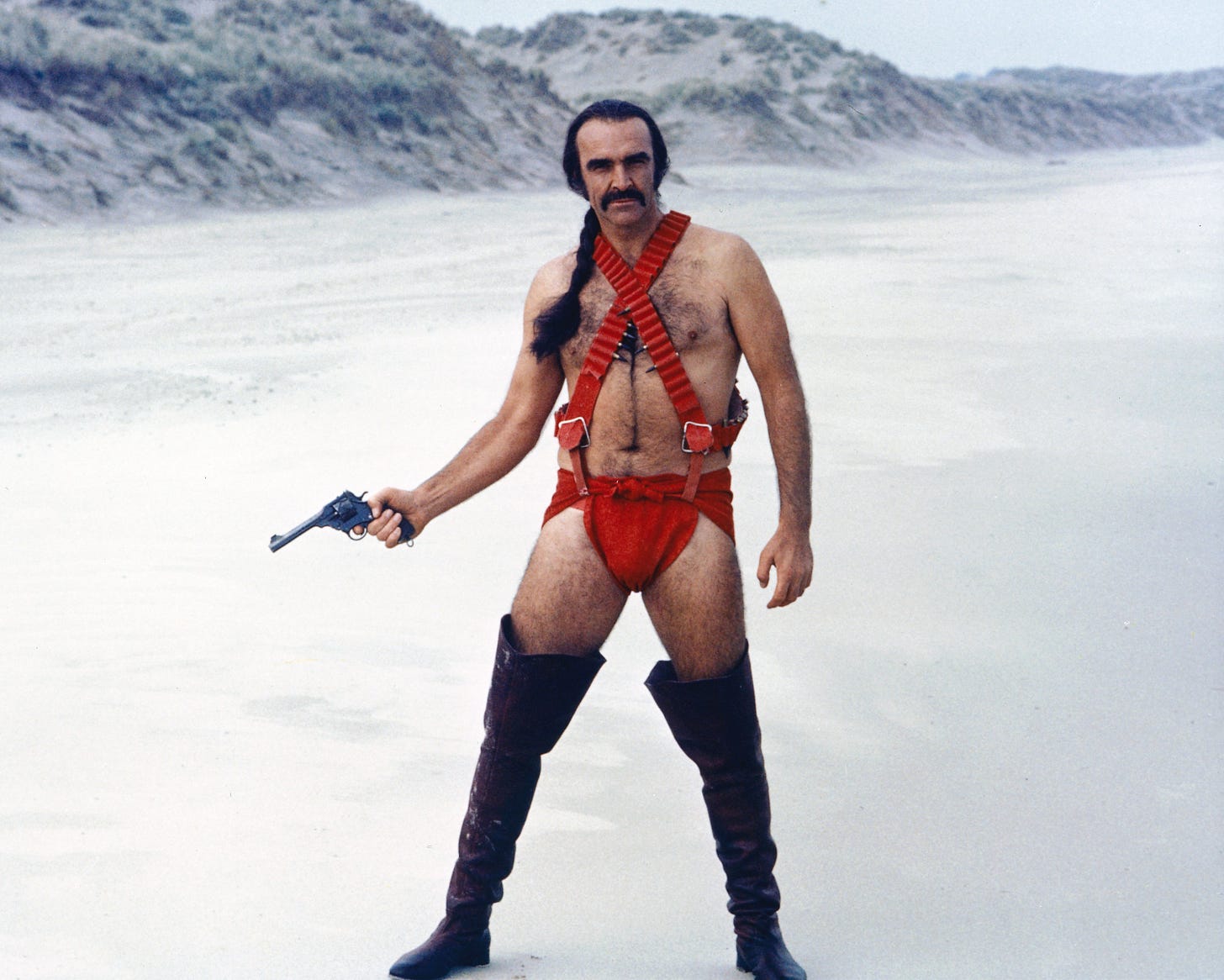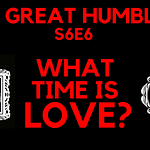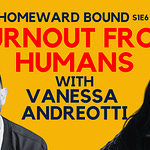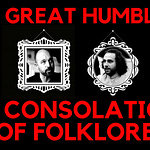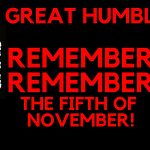In our first episode of 2025, we get inspired by Anthony Galluzzo’s Against the Vortex to watch the cult 1974 movie Zardoz, featuring Sean Connery in what appears to be a prototype for the mankini. In Galluzzo’s book, Zardoz features as a surprisingly prescient story for thinking about techno-utopias (or dystopias), degrowth and deceleration in the 21st century, as well as bringing into view an under-recognised current of “critical Aquarianism” in 1970s counterculture, distinct from both the self-centred therapeutic turn (see Adam Curtis’s Century of the Self) and the “hippie modernist cults of technology” (touched on when we discussed ‘Spaceship Earth’ in S1E4).
Before we get to that, Dougald references his recent Resilience.org event with Vanessa Andreotti, who commented that before January, she regularly got questions from audiences along the lines of “What’s the evidence that modernity is dying?” Since January, no one has asked her this, which is one facet of the ways the world has changed in these months.
Ed brings up Sam Conniff and Katherine Templar Lewis’s Uncertainty Experts and an increased willingness of people he deals with in institutional settings to admit to their uncertainty.
This leads us onto the subject of belief and its relationship to certainty/knowing and uncertainty/mystery – and Ed points out that Marc Andreessen’s Techno-Optimist Manifesto (which he has been reading so the rest of us don’t have to) includes 113 statements that begin with “We believe”.
Dougald mentions the essay on John Berger that he wrote for the first Dark Mountain book, and how Berger’s later writing – inspired by the old peasants he lived alongside in the Haute Savoie – models the possibility for “a cohabitation with mystery, not an attempt to enclose or eliminate it”.
Mankinis and Manifestos
At this point, we get on to the matter of Sean Connery’s mankini and Anthony Galluzzo’s book. What Anthony is doing in drawing attention to the “critical Aquarian” current within 1970s thought has parallels with the project of our friends Elias Crim and Pete Davis with The Lost Prophets Podcast.
Ed points out the shades of Ursula K. Le Guin in the storyline of Zardoz, bringing us back to ‘The Ones Who Walk Away From Omelas’. (Though Zed, the Connery character, is more a case of one who breaks into Omelas and fights to bring it down.)
Dougald wonders about the parallels between John Boorman’s Zed and John Berger’s G. In Berger’s novel, which won the Booker prize in 1972, there’s also a central character whose name is (or sounds like) a single letter and who represents some kind of… well, phallocentric revolution. There’s also an aesthetic similarity, in that both Boorman’s film and Berger’s book pursue a cubist fragmentation of the singular perspective and linear timeline.
Dougald also mentions the 1976 film which Berger wrote with Alain Tanner, Jonah Who Will Be 25 In The Year 2000, which speaks to the tail end of the moment of critical Aquarianism.
In a key passage in Against the Vortex, Galluzzo sums up the question which united those he considers to be critical Aquarian thinkers, and its continuing relevance:
How to exit the dead end of industrial modernism and its legitimating fictions—utilitarianism, Prometheanism, productivism and its ecocidal dreams of endless growth, secular immortality, and total control—in the face of interrelated material, ecological, and spiritual crises without sliding into the reactionary antimodernism that, for example, led certain disillusioned Western intellectuals to embrace the Iranian revolution at the end of the Seventies? While the urgency of the crises has increased a hundredfold since the 1970s, the question remains unanswered.
Not a bad description of the questions we’ve been asking on The Great Humbling.
Dougald picks up another element in Against the Vortex, where Galluzzo contrasts the critical Aquarian current of environmentalism represented by Illich with the technocratic, expert-centred environmentalism represented by Stewart Brand – and suggests that it would be worth bringing this into dialogue with the slightly different “genealogy of green politics” offered by Stephen Quilley in ‘Ecology “After Virtue” and After Modernity’. The main difference between these two maps is that Quilley locates neo-Malthusian environmentalism as opposed to a tech-focused mainstream environmentalism, whereas Galluzzo (following Giorgos Kallis’s Limits) identifies Malthusian thought as aligned with the logic of growth.
This brings us back to Marc Andreessen and the Techno-Optimist Manifesto, which Ed describes as “not so much Effective Altruism as Effective Accelerationism”, partly inspired by Marinetti’s Manifesto of Futurism.
Dougald asks where Andreessen is now on the map of tech politics in the era of Trump 2 – has he gone full Gay Space Fascism? (For those unfamiliar with the term, he recommends Jonathan Cioran’s essay for Mere Orthodoxy.)
Ed quotes Elizabeth Spiers on Andreessen’s manifesto: “[It] has the pathos of the Unabomber … but lacks the ideological coherency.”
Ed introduces Hard Imagination, a “dark white paper” produced by Indy Johar, David Johnston and Clare Farrell as a counter to the Techno-Optimist Manifesto.
The “Lad Hybrid” Decelerates
At this point, the Great Humbling takes an unexpected turn into Top Gear territory with the sad tale of the 2016 Volkswagen Passat GTE for which you have to take out a mortgage in order to replace the gearbox.
Maybe because of reading John Michael Greer’s ‘Lords of the Fall’, in which the one-time Archdruid Report author returns to the themes of the collapse of complex societies (nod to Joseph Tainter), the counterproductive complexity of the hybrid gearbox comes to feel like a metaphor for what’s wrong with the way we’re approaching the climate crisis.
David Fleming’s Lean Logic gets a mention, in particular the entry on Needs and Wants, which points out that our wants are mostly quite humble and its the needs imposed by the complexity of modern societies that are the disaster.
Ed suggests the car should make a final journey to the church-in-the-ruins at Covehithe and it all gets a bit KLF for a moment.
Listeners of The Great Humbling who know more about cars than Dougald are invited to offer advice.
Quiet Collapsitarians
We finish up by discussing Rob Harrison-Plastow’s article, ‘Why Well-Off Brits Who Think Collapse Is Coming Still Stay Silent’, which suggests that a critical mass of middle class professionals has come to the conclusion that “the systems we rely on for survival are far more fragile than they appear, are deeply flawed and contain within them dynamics that keep us locked in to a dangerous trajectory”, but many of them are keeping quiet about this.
Implicit in Harrison-Plastow’s article is the idea from Alexei Yurchak’s book about the last years of the Soviet Union, Everything Was Forever, Until It Was No More, that revolutionary change is a two-stage process: in the first stage, everyone stops believing in the existing system; in the second, everyone realises that everyone else has stopped believing in it.
Dougald asks what is meant to happen, at the point when everyone realises that everyone else (or at least, lots of others) have come to the same conclusion? There’s a risk of a kind of wishful thinking here, that if only we all realise and admit the depth of the trouble we are in, we know how to make things better. Bearing in mind the Greer/Tainter piece about the relationship between societal complexity and collapse and the example of the hybrid motor, he suggests that we need to look at the uncomfortable questions Stephen Quilley is asking about the tendency to assume the entitlements of high-tech, liberal, individualist late modernity are somehow compatible with taking seriously the implications of our ecological crisis.
This brings us back to Vanessa’s comments in the Resilience event and her observation that there is an “inflated sense of agency” that haunts the imagination of the Global North that looks weird from a Brazilian perspective. In that conversation, Vanessa and Dougald tried out the contrast between this “pedestal” model of agency and a “mycelial” mode of agency.
A final thought comes from Wendell Berry’s The Need to Be Whole, paraphrased by Dougald: when hate hates love, it is true to itself; when love hates hate, it betrays itself. Not thinking that hating hate can fix anything, and working out what the loving moves look like within a model of agency that isn’t self-deceiving – maybe these are our questions in this humbling spring of 2025?
Thanks, everyone, for listening and sharing and supporting our work in multiple ways. Check out more episodes of The Great Humbling and Homeward Bound at homewardbound.org. Learn more about Ed’s work on his website, and read more from Dougald at his Substack, Writing Home, where you can support the making of this podcast by becoming a paid subscriber.



